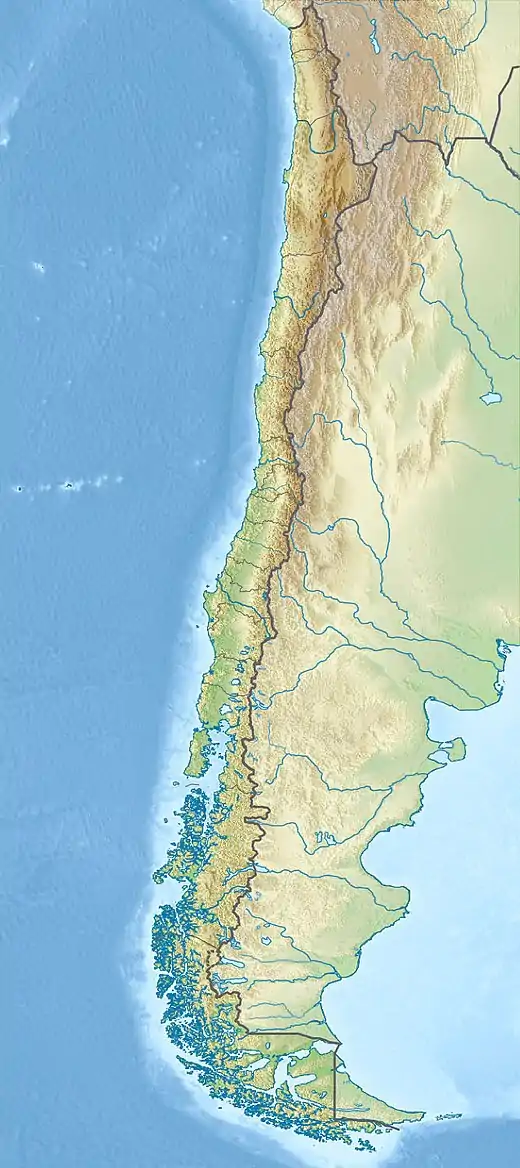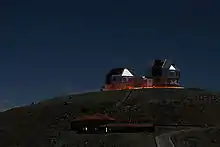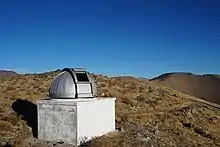Las Campanas Observatory
Las Campanas Observatory (LCO) is an astronomical observatory owned and operated by the Carnegie Institution for Science (CIS). It is in the southern Atacama Desert of Chile in the Atacama Region approximately 100 kilometres (62 mi) northeast of the city of La Serena. The LCO telescopes and other facilities are near the north end of a 7 km (4.3 mi) long mountain ridge. Cerro Las Campanas, near the southern end and over 2,500 m (8,200 ft) high, is the future home of the Giant Magellan Telescope.
 Telescopes at Las Campanas Observatory | |
| Organization | Carnegie Institution for Science |
|---|---|
| Observatory code | 304 |
| Location | Atacama Region, Chile |
| Coordinates | 29°00′57″S 70°41′31″W |
| Altitude | 2,380 m (7,810 ft) |
| Established | 1971 |
| Website | www |
| Telescopes | Du Pont Telescope Swope Telescope Warsaw Telescope Giant Magellan Telescope Magellan Telescopes |
 Location of Las Campanas Observatory | |
LCO was established in 1969 and is the primary observing facility of CIS. It supplanted Mount Wilson Observatory in that role due to increasing light pollution in the Los Angeles area. The headquarters of Carnegie Observatories is located in Pasadena, California, while the main office in Chile is in La Serena next to the University of La Serena and a short distance from the Association of Universities for Research in Astronomy facility.[1]
It is served by Pelicano Airport, 23 kilometres (14 mi) to the southwest.
Telescopes
- The 6.5 m (260 in) Magellan Telescopes are two identical single-mirror reflecting telescopes. The Walter Baade Telescope saw first light in 2000, and the Landon Clay Telescope in 2002. They are managed by LCO for an international consortium of institutions which includes LCO.[2][3]
- The 2.5 m (98 in) du Pont Telescope is named after industrialist Irénée du Pont and has been in operation since 1977. It is a Ritchey-Chrétien telescope with a Gascoigne corrector lens, and was built by Boller & Chivens and L&F Industries.[4][5]
- The 1.0 m (39 in) Swope Telescope was the first telescope installed at LCO, and began operating in 1971. It is named after CIS astronomer Henrietta Swope. It is a Ritchey-Chrétien telescope built by Boller & Chivens with a Gascoigne corrector lens.[6][7]
Tenant telescopes
- The 1.3 m (51 in) Warsaw Telescope is the main instrument of the Optical Gravitational Lensing Experiment operated by the University of Warsaw Observatory. Installed in 1996, it is a Ritchey-Chrétien design built by DFM Engineering.[8] Exact location: 29°00′35.8″S 70°42′05.9″W ± 1 meter, altitude of the base of the building 2,275 metres (7,464 ft) over mean sea level.
- The All Sky Automated Survey (ASAS) is a project to monitor the southern sky for variable stars. It consists of two wide-field telescopes, one narrow field telescope, and one ultra-wide field telescope. A prototype system was installed in 1996 and a second in 1997, both in the same enclosure as the 10-inch astrograph. The three larger telescopes were installed in 2000. The ultra-wide device was added in 2002 when the existing telescopes were moved to a new, smaller enclosure.[9] Location: 29°00′36.9″S 70°42′05.1″W ± 5 meter.
- The Hungarian Automated Telescope South (HAT-South) facility is part of the HATNet Project to detect exoplanets using the transit method. It consists of a pair of four 0.18 m (7.1 in) Takahasi reflecting astrographs on a common mount. It was installed in 2009.[10]
- The Birmingham Solar Oscillations Network (BiSON) operates at station at LCO.[11]
Former telescopes
- The 4.0 m (13.1 ft) NANTEN millimeter-wavelength radio telescope was located at LCO from 1995 to 2004. It is now located at the Pampa La Bola site of the Llano de Chajnantor Observatory and is known as the NANTEN2 Observatory.[12]
- The 0.61 m (24 in) Helen Sawyer Hogg Telescope (HSHT) was operated at LCO by the University of Toronto Southern Observatory from 1971 to 1997. It is now located at Leoncito Astronomical Complex.[13]
- A 0.25 m (10 in) astrograph operated at the site for some time, and was used to discover Supernova 1987A (SN 1987A).[14]
- The Pi of the Sky project operated two wide-angle cameras that searched for the optical signature of gamma ray bursts at LCO starting in 2004. The installation was moved to a commercial telescope hosting site in San Pedro de Atacama in 2011.[15]
Future telescopes
- The Giant Magellan Telescope is an extremely large telescope under construction[16] at LCO, with completion expected in 2025. It is 24.5 m (80 ft) effective aperture design with seven 8.4 m (28 ft) segments. The telescope will have a light-gathering area of 368 m2 (3,960 sq ft), which is roughly fifteen times greater than one of the Magellan telescopes. The mirrors are being fabricated by the Steward Observatory Mirror Laboratory, and the first was started in 2005.[17]
- The Local Volume Mapper of the SDSS-V will consist of 4 telescopes (siderostats) with 0.16 m diameter each. [18][19]
Discoveries
On February 24, 1987 at LCO, Ian Shelton and Oscar Duhalde became the first official observers of Supernova 1987A (SN 1987A).[14]
On August 17, 2017 at LCO, SSS17a, the optical counterpart to the gravitational wave source GW170817, was discovered with the Swope telescope.[20]
Gallery
 du Pont telescope
du Pont telescope Warsaw telescope dome and control building
Warsaw telescope dome and control building Warsaw telescope
Warsaw telescope Clay telescope (one of the Magellan telescopes)
Clay telescope (one of the Magellan telescopes) Magellan telescopes
Magellan telescopes Magellan telescopes, Warsaw and Swope telescopes (LTR)
Magellan telescopes, Warsaw and Swope telescopes (LTR) ASAS telescopes
ASAS telescopes BiSON Solar Telescope
BiSON Solar Telescope
References
- "History | The Carnegie Observatories". The Carnegie Observatories. Retrieved 2012-01-24.
- "Magellan Telescopes (6.5m) | The Carnegie Observatories". The Carnegie Observatories. Retrieved 2012-01-24.
- "Magellan Telescopes — Las Campanas Observatory". Las Campanas Observatory. Retrieved 2012-01-24.
- "The du Pont Telescope | The Carnegie Observatories". The Carnegie Observatories. Retrieved 2012-01-24.
- "The Irénée du Pont Telescope — Las Campanas Observatory". Las Campanas Observatory. Retrieved 2012-01-24.
- "The Swope Telescope | The Carnegie Observatories". The Carnegie Observatories. Retrieved 2012-01-24.
- "The Henrietta Swope Telescope — Las Campanas Observatory". Las Campanas Observatory. Retrieved 2012-01-24.
- "General Description of OGLE". Warsaw University Observatory. Retrieved 2012-01-24.
- "All Sky Automated Survey - The ASAS-3 System". Warsaw University Observatory. Retrieved 2012-01-24.
- "HAT-South homepage". Harvard Smithsonian Center for Astrophysics. Archived from the original on 2014-02-18. Retrieved 2012-01-24.
- "High-Resolution Optical Spectroscopy - University of Birmingham". University of Birmingham. Retrieved 2012-01-24.
- "The NANTEN2 Telescope | NANTEN". University of Birmingham. Retrieved 2012-01-24.
- "Complejo Astronómico El Leoncito - Helen Sawyer Hogg Telescope". Complejo Astronómico El Leoncito. Retrieved 2012-01-23.
- "SN1987A's Twentieth Anniversary". ESO Press Release: 8. 2007. Bibcode:2007eso..pres....8.
- "Pi of the Sky". Pi of the Sky. Archived from the original on 2012-12-21. Retrieved 2012-01-24.
- "The Giant Magellan Telescope Organization Breaks Ground in Chile" (Press release). GMTO Corporation. 11 November 2015.
- "Overview - Giant Magellan Telescope". GMTO Corporation. Archived from the original on 2011-06-09. Retrieved 2012-01-24.
- Kollmeier, Juna A.; Zasowski, Gail; Rix, Hans-Walter; Johns, Matt; Anderson, Scott F.; Drory, Niv; Johnson, Jennifer A.; Pogge, Richard W.; Bird, Jonathan C.; Blanc, Guillermo A.; Brownstein, Joel R.; Crane, Jeffrey D.; De Lee, Nathan M.; Klaene, Mark A.; Kreckel, Kathryn; MacDonald, Nick; Merloni, Andrea; Ness, Melissa K.; O'Brien, Thomas; Sanchez-Gallego, Jose R.; Sayres, Conor C.; Shen, Yue; Thakar, Ani R.; Tkachenko, Andrew; Aerts, Conny; Blanton, Michael R.; Eisenstein, Daniel J.; Holtzman, Jon A.; Maoz, Dan; et al. (2017). "SDSS-V: pioneering panoptic spectroscopy". arXiv:1711.03234 [astro-ph.GA].
- "SDSS-V Pioneering panoptic spectroscopy". Bulletin of the AAS. 51 (7). 2020.
- Coulter, D. A.; Foley, R. J.; Kilpatrick, C. D.; Drout, M. R.; Piro, A. L.; Shappee, B. J.; Siebert, M. R.; Simon, J. D.; Ulloa, N. (2017-10-16). "Swope Supernova Survey 2017a (SSS17a), the optical counterpart to a gravitational wave source". Science. 358 (6370): 1556–1558. arXiv:1710.05452. Bibcode:2017Sci...358.1556C. doi:10.1126/science.aap9811. ISSN 0036-8075. PMID 29038368. S2CID 206664790.
External links
| Wikimedia Commons has media related to Las Campanas Observatory. |